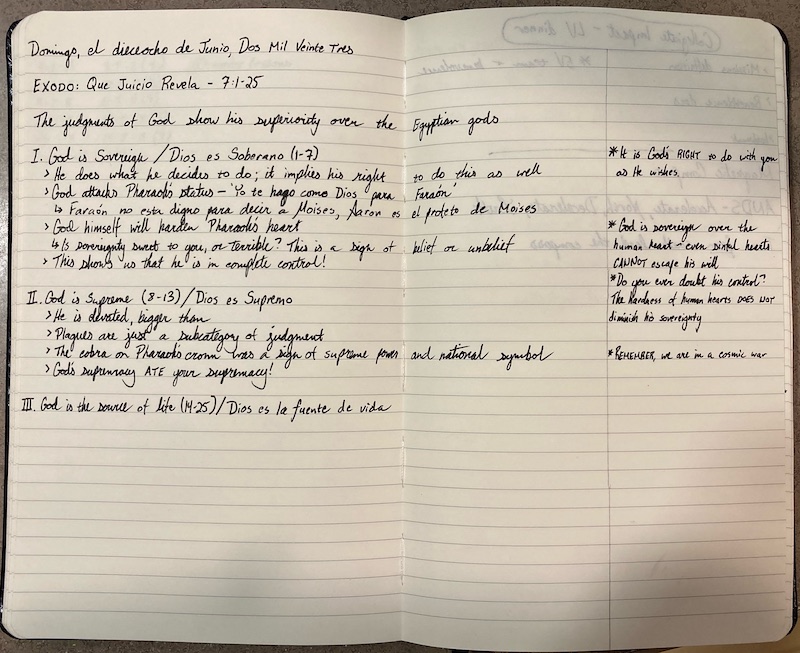
Worshipping as a Monotask
Four Monotasks
Two months ago I wrote about how to keep your phone from preventing monotasks. Today I want to continue pursuing the idea of ‘monotasking’ from a Christian perspective. I also want to be intensely practical.
Wine (author of ‘The Twelve Monotasks’) recommended a list of many ‘monotasks.’ Some of these include ‘Eating,’ ‘Getting There,’ and ‘Seeing.’ While I see his point, I feel that this list is too long. It is true that any action can be ‘monotasked’ – performed with complete focus, undistracted. But there are only a few actions that are monotasks – actions that demand complete focus.
Besides, our focus – like our discipline – is limited. Rather than making everything a matter of focus, let’s make the most important things a matter of focus. Otherwise, our focus will burn out early. If everything is a monotask, then maybe nothing is really a monotask.
Rather than expanding the list, let’s diminish the list. I would recommend that there are four core monotasks: actions that should always be performed with our full focus, without distraction. These monotasks are worshipping, studying, conversing, and recreating. I’ll be addressing each of these over the next few months. Today, let’s start with worship.
Worshipping as a Monotask
I’m using the word ‘worshipping,’ but I mean it in a broad sense. I almost prefer the word ‘communing,’ as in ‘communing with God.’ What I’m referring to is every time that we set aside time to intentionally spend time with God. As Christians, we should be doing this at least daily, in our personal devotions, with extra time on Sundays at church.
Hence, worshipping includes a number of activities: personal Bible reading, personal prayer, the entirety of the Sunday sermon, prayer meetings, and any other time that is specifically set aside for devotional purposes.
It should be obvious why I list this as one of just four monotasks. Spending intentional time with God, to hear from his Word and to bring our hearts before him in prayer, ought to be the most sacred part of each day. It demands our full attention. How can we make the most of this time? I’m sure you can come up with many ideas in your own life. Here are a few thoughts that have been helpful for me.
Have a set time and place. This is obvious but important. When we go to church, this happens automatically – we got to the same place at the same time. But this intentionality should also define our worship each day. So, do your personal devotions at the same place. Choose a comfortable chair, or a tucked-away table, where you can focus entirely on God’s Word. Ideally, do this at the same time every day, such as right after you wake up. Whatever place and time you choose, the goal is to make this habitual, so that you do it naturally. Monotasks are most effective when they come naturally.
Remove all distractions. The specific distractions that you must deal with will vary from those that I deal with. But the obvious ones are simple. Make sure that your phone is in another room. Don’t have a TV playing. It’s also best not to do your devotions in a place where people-watching will likely distract you. Also, have a way to jot down ideas that come to you during your worship. Did you just remember that you need to call someone today? Have a notepad nearby so that you can jot that thought down. It’s better to take a moment to do this than to get so distracted by that thought that you (1) make the call immediately, or (2) can’t focus on your worship because you don’t want to forget this. Similarly, have a way to record random ideas during church, because you don’t want those thoughts distracting from the service.
Associate your worship with reflective actions. I have a hot drink (normally coffee) every time that I read my Bible, for one simple reason: I can’t rush a hot drink. It’s easy to chug a soda or a cup of water, but I can’t do the same with coffee or hot chocolate. These beverages force me to slow down. I also often listen to calm, soothing music when reading Scripture – because again, it slows me down and helps me concentrate. These strategies may not work for you, but what can you do to help yourself slow down? How can you get into a reflective, quiet mindset when you approach God’s presence?
Have a pre-worship ritual. It’s important to prepare your heart for God’s presence, but it’s especially important when life is hectic. This is why – if you do your devotions on waking up – it’s important not to check your phone when you first get out of bed. Checking your phone introduces the chaos of life at a moment when you should be focused only on God. Similarly, preparing for church is often a hectic time, so take the drive to calm yourself. I only listen to hymns or worship music when driving to church, as this ritual helps me to focus my mind on what I am about to do.
Have a plan. Monotasking implies that you are giving your full focus to what you are doing. Your worship should be intentional as well. So, have a plan for what you are doing. Don’t open your Bible at random. Choose a book of the Bible to read or a passage to study. Know, before the time comes to read, what you will be reading. Be sequential and intentional in your reading. Similarly, your prayers should be intentional. Have a plan for your prayers, who you are praying for, how you outline your prayer time. The Lord’s Prayer is a great way to structure your prayer topics.
Take generous notes. If you don’t have a dedicated place for saving your reflections while worshipping, get one. You can include them in your journal, if you already journal. Otherwise, get a nice journal or notebook that you keep with you. Write down what stands out to you as you read the Bible. Take generous notes during the Sunday sermon. I find that the more notes I take during the sermon, the more I will profit from the sermon. Even if you find the sermon to be dull, make it a point to write down all you can from it. This turns you into an active listener.
Leave room for application. As you take notes (whether in your personal Bible reading or while listening to a sermon), it’s important to not only note what was actually said, but also how it strikes you. How does this apply to your life? If this is true, what does it mean for you? How does this truth apply to your specific situations? Jot down any notes of application, and any other thoughts prompted by this truth. Many of the articles that I’ve written on this blog were prompted by thoughts that come to me during my own Bible reading.
Have blank space. Here’s how I do it: on Sunday mornings, I open my journal to an entirely empty spread of pages: both sheets are blank. I take notes across the entirety of both pages, but on the side of one page I mark off a margin for any ways that this truth affects me personally. I want to write down how this truth applies in my life. (See the picture below). By setting aside not just one page, but two pages, I have the sense of ‘blank space.’ It’s uncluttered by other ideas. I’m not limited in space. I have full room to think through the text or sermon, and to explore all the ways that this speaks into my life. This is the goal in all our worship: to have blank space – ‘sacred space’ – in our lives to listen to and commune with the Almighty God.
Here is how I take notes in church; note the wide margin on the right for application. Ignore my use of foreign language for note-taking!

In place of comments, I would love to hear from you personally. Please reach out to me via the Contact Page to share your thoughts and perspectives on this post!
Enjoying this content? Subscribe to receive it directly in your email, once a week.





